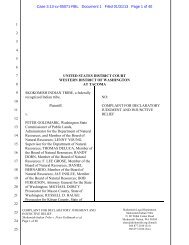Appellant Brief - Turtle Talk
Appellant Brief - Turtle Talk
Appellant Brief - Turtle Talk
Create successful ePaper yourself
Turn your PDF publications into a flip-book with our unique Google optimized e-Paper software.
Indian lands applied to the right-of-way–was dependent on the specifics of that<br />
right-of-way and the facts of that case.<br />
It is well established that cases are not authority for propositions not<br />
considered, see United States v. L.A. Tucker Truck Lines, Inc., 344 U.S. 33, 38<br />
(1952), and the propositions at issue here were not considered in Strate.<br />
"Questions which merely lurk in the record, neither brought to the attention of the<br />
court nor ruled upon, are not to be considered as having been so decided as to<br />
constitute precedents." Cooper Indus., Inc. v. Aviall Servs., Inc., 543 U.S. 157, 170<br />
(2004). Even where a prior case addresses an issue in dictum, or an otherwise<br />
indirect manner, a subsequent court should not consider it binding precedent. See<br />
United States v. Norris, ___ F.3d ___, 2007 WL 1174862, at *7 (8th Cir. Apr. 23,<br />
2007) (Colloton, J., concurring) ("I would not read the opinion implicitly to make a<br />
definitive statement on an issue that was not raised."); see Brecht v. Abrahamson,<br />
507 U.S. 619, 630-31 (1993) (holding that stare decisis does not apply unless the<br />
issue was "squarely addressed" in prior decision).<br />
In Strate, the Court addressed whether a tribe retained jurisdiction to<br />
adjudicate claims associated with a particular right-of-way over which that<br />
particular tribe retained very little authority. It did not consider whether a more<br />
15

















